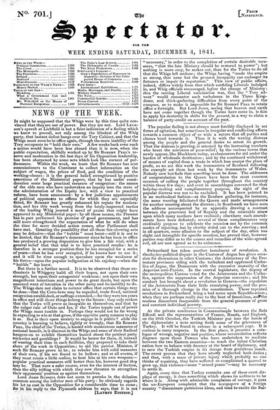NEWS OF THE WEEK.
IT might be supposed that the Whigs were by this time quite con- vinced that they are out of power. But they are not. Lord LEVE-• SON'S speech at Lichfield is but a faint indication of a feeling which we know to prevail, not only among the blindest of the Whig party, that instant defeat hangs over the Tory Cabinet, and that the Whigs must soon be in office again, through the mere inability of the Tory occupants to "hold their own." A few weeks back even such a notion would have been less absurd than it is now, when the public expectation, skilfully worked up by Sir ROBERT PEEL'S re- serve and moderation in the last days of his Opposition leadership, has been sharpened by some acts which look like earnest of per- formance. Within the week, we learn that Sir ROBERT has sent commissioners to the Continent to collect information on the subject of wages, the prices of food, Ind the condition of the working-classes : it is the general belief, strengthened by positive assertions of the Ministerial papers, that he has under consi- deration some large practical measure of emigration : the names of the able men who have undertaken an inquiry into the state of the administration of the Equity law, with a view to practical reform, have been announced : by a few judicious appointments of political opponents to offices for which they are especially fitted, Sir Ronsier has greatly enhanced his repute for modera- tion, and has this week wrung from the lately-improved tactics of the leading Whig journal a meed of praise that might have appeared in any Ministerial paper : by all these means, the Premier has in part performed his promise of good government, and has still more strengthened the expectation of what he will do when the time for more decided action comes, after Parliament shall have met. Granting the possibility that all these fair-showing acts may be delusive—that the " bubble " must burst—still it is not to be denied, that Sir ROBERT'S demeanour since he has been in office has produced a growing disposition to give him a fair trial, with a general belief that that trial is to have practical results : he is therefore in a stronger position than he has occupied for a series of years—than he has ever occupied, if he knows how to use it ; and it will be time enough to speculate upon the weakness of his forces—upon the popular indignation at his cajolery—when the "bubble" has burst.
But there is a further moral. It is to be observed that these en- thusiasts in Whiggery build all their hopes, not upon their own strength, but upon their antagonists' weakness ; not upon their own magnificent intentions and power to do great deeds, but upon the assumed want of intention in the other party and its inability to do. The Whigs dare not claim to reenter office that certain things may be done—that the Corn-laws may be repealed, trade freed, national emigration established, or suffrage extended,—for they were ten years in office and still those things belong to the future : they only reckon that the Tories will prove as incapable as themselves, and that by the vulgar rule of Outs and Ins, if the Tories topple out of power the Whigs must tumble in. Perhaps they would not be far wrong in expecting to win at that game, if the opposite party consent to play it so. But is their open anxiety to engage in it politic ? -while the country is learning to believe, rightly or wrongly, that Sir ROBERT PEEL, the chief of the Tories, is busied with momentous measures of national benefit, is it discreet in the Whigs and some of their Radical bangers-on to exhibit themselves busied about the pettiest party trickeries and gamblings ? If Would be better for them, if, instead of wasting their time in such futilities, they prepared to take their share of the work in Opposition ; to aid the patriot Minister, if such Sir ROBERT prove to be ; to rebuke him with solid measures of their own, if his are found to be hollow ; and at all events, if they must retain a little malice, to beat him at his own weapons- popidar practical measures still better than his, however good they may be. That were a safer course, even for the interest of faction, than the silly trifling with which they now threaten to strengthen their opponents' position as against themselves. Lord JOHN Rustism does not seem to partake in the delusion common among the inferior men of his party : he obviously regards his lot as cast in the Opposition for a considerable time to come ; for in his reply to the Plymouth address he says, that it is not "necessary," in order to the completion of certain desirable mea- sures, "that the late Ministry should be restored to power"; but nothing is more easy, he makes out, than for the Tories to do all that the Whigs left undone ; the Whigs having "made the empire so strong, that none but the grossest incapacity can endanger its fortunes or impair its reputation." This view of public affairs, indeed, differs widely from that which confiding Liberals indulged in, and Whig officials encouraged, before the change of Ministry : then the ranting Liberal vaticination was, that the "Tory ad- vent" would encounter such turbulence in the Three King- doms, and thick-gathering difficulties from every point of the compass, as to make it impossible for Sir ROBERT PEEL to retain office a fortnight. But Lord JOHN, seeing that heaven and earth have not come together though the Tories have come in, is fain to apply his dexterity in shifts for the present, in a way to claim a balance of party-credit on account of the past.


























